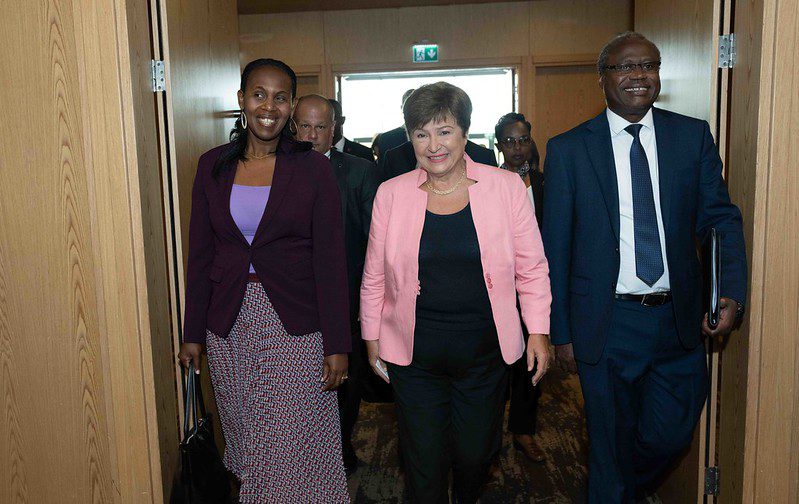
Global Courant 2023-04-12 21:04:12
The World Bank and IMF began their spring meetings Tuesday in Washington DC amid fears of runaway inflation, instability in the banking sector and simmering geopolitical tensions.
But as richer countries prepare to tighten their belts, economists are calling for a massive increase in funding for developing countries to cope with the green transition, the fallout from Covid and the risks of a serious debt crisis.
Many African delegations arriving in the US capital will be looking for a breakthrough in talks between China and the IMF on how to restructure billions of dollars in poor country debt to release much-needed aid.
With 25% of emerging markets and 60% of low-income countries, including Africa, in or near debt distress, up to $520 billion needs to be written off by richer countries, according to a recent Boston University report.
“The debt crisis needs to be resolved urgently to avoid defaults while the IMF and the World Bank meet,” said Zem Negatu, the chairman of Fairfax Africa Fund.
A central tension looming in the debt talks is whether China, the IMF and World the Bank can write off some of this debt, said Kenneth Rogoff, IMF chief economist and professor at Harvard University.
"It's been a real struggle," he told the BBC.
Over the past 15 years, China has become the largest bilateral lender to many emerging economies, including Africa. This has led to a "new system of international bailout loans", with China acting as a "lender of last resort", according to a recent report.
The covid-19 pandemic combined with the Russian invasion of Ukraine has increased the risks of indebtedness in Africa, with 22 African countries now in debt distress or at high risk.
“The problem with the IMF is that it's really set up for short-term lending, the World Bank is the one set up for development aid,has run out of resources a little bit – there just needs to be a lot more aid funds in developing countries. Not only do they need short-term loans, they need help. Rogoff told the BBC.
After a lengthy break due to Covid-19, a Chinese delegation will attend the talks for the first time in three years.
Meanwhile, the IMF fears that China could withdraw its membership, a move that would threaten the entire system of globalization, says Rogoff.
Debt talk
Countries such as Zambia and Ghana arrive for the meetings at a time when they are in the midst of debt restructuring talks involving loans from Chinese creditors such as the China Export-Import Bank.
On the sidelines of the meetings, Zambia's Finance Minister Situmbeko Musokotwane appealed to the IMF for a solution to the restructuring of its external debt, which stood at $14.87 billion at the end of June 2022.
Last week, IMF chief Kristalina Georgieva said Zambia will need official creditors, led by China and France, to agree to a debt relief deal before the IMF releases the final $188 million tranche of a $1.3 billion Extended Credit Facility ( ECF) draws. September.
On Tuesday, Musokotwane begged the Fund to release the funds even if Zambia's creditors cannot reach an agreement on how to deal with the national debt.
“Zambia has performed according to the program, so it should not be penalized. It should be rewarded," he said in an interview with Bloomberg TV.
Banga's Big Week
The spotlight at this year's spring meetings will also be on Ajay Banga, whose appointment as the next head of the World Bank has sparked hopes of reforming the 78-year-old credit model, particularly for developing countries.
Banga, who is expected to be confirmed as the bank's president in the coming weeks, is under pressure from African countries to implement reforms to address the continent's energy poverty and climate change challenges. This includes reshaping the role of the World Bank to support low- and middle-income countries in responding to these challenges, providing funding for clean energy infrastructure and promoting access to energy.
Day 1 – Tuesday
Day 1 of the meetings marked the release of the World economic outlook it saw the outlook for global growth diminish in the face of skyrocketing inflation, rising interest rates and uncertainties surrounding the collapse of two US banks.
Economic growth in sub-Saharan Africa is expected to slow to 3.6% in 2023 and then accelerate to 4.2% in 2024, the IMF predicts in the report.
Nigeria's growth is expected to fall from 3.3% in 2022 to 3.2% this year, while South Africa's growth of 2% in 2022 is expected to fall to 0.1% in 2023.
Consumer prices are expected to remain elevated, with inflation averaging 14.5% in 2022, declining to 14.0% in 2023 and falling further to 10.5% in 2024.
The region's current account balance is expected to remain negative, with an average deficit of 2.0%, 2.6% and 2.7% in 2022, 2023 and 2024, respectively.
Unemployment rates are expected to remain high in some countries, particularly South Africa, where they are expected to remain above 30% over the forecast period. Low-income countries are expected to experience relatively higher growth rates than middle-income and oil-exporting countries.
Source: IMF World Economic Outlook 2023 – A Rocky Recovery
Day 2 – Wednesday
A crucial high-level roundtable on sovereign debt will be held on Wednesday in the margins of the summit amid continued delays in finalizing debt-handling agreements for Zambia, Ghana and Ethiopia.
China is expected to waive its demand that multilateral development banks take losses along with other creditors in restructuring sovereign debt for poor countries, a source told Reuters. The move is seen as a major breakthrough in efforts to provide debt relief for these countries.
Debt solution to dominate the talks between the IMF and the World Bank
Next Big Thing in Public Knowledg
https://globalcourant.com/debt-solution-to-dominate-the-talks-between-the-imf-and-the-world-bank/